I ask again for the front page: how is the idea of Mickey Rourke playing Genghis Khan any less ridiculous than John Wayne doing the same thing 54 years ago?

I ask again for the front page: how is the idea of Mickey Rourke playing Genghis Khan any less ridiculous than John Wayne doing the same thing 54 years ago?

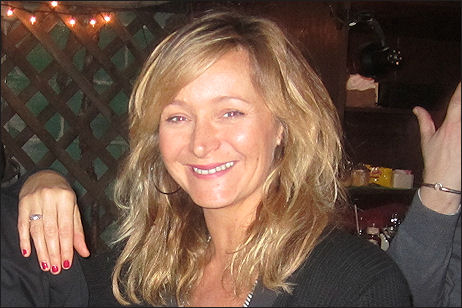
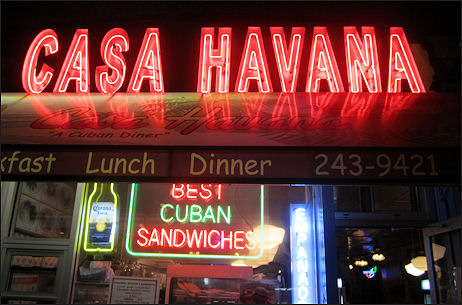
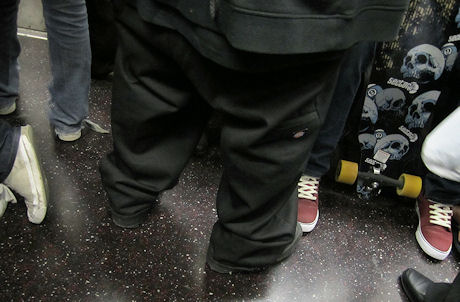 Fat guy on L train wearing standard hip-hop homey duds. “I want some extra-large cargo pants, y’know, witth the crotch area drooping down to my knees,” etc.
Fat guy on L train wearing standard hip-hop homey duds. “I want some extra-large cargo pants, y’know, witth the crotch area drooping down to my knees,” etc. Disgraced wheeler-dealer Jack Abramoff has become a reformed whore, says director Alex Gibney whose documentary, Casino Jack and the United States of Money, a study of Abramoff’s abuses, is being screened before its May 7th release. (Gibney’s untitled Eliot Spitzer doc is also being shown this evening at a special Tribeca Film Festival screening.)

“He’s going to get out [of jail] soon,” Gibney tells N.Y. Times profiler John Anderson. “I was going to tell him that, like my movie or hate my movie, he should use my movie. Go out with it. He’s become a born-again anti-lobbyist. He’s convinced now that lobbying is horrible thing. And it would be the greatest to hear from Jack Abramoff exactly how it’s done. I’d buy tickets to that.”
Anderson’s 4.25 piece also sketches the animosity between Gibney and director George Hickenlooper, who narrative feature about Abramoff, as portrayed by Kevin Spacey, was also called Casino Jack. But when push came to shove about who would get to use the title, “Mr. Hickenlooper blinked,” says Anderson.
Attention must be paid to David Thomson‘s New Republic review of Peter Biskind‘s Star: How Warren Beatty Seduced America for the simple fact that Thomson, author of Warren Beatty and Desert Eyes, knows the realm of this former Hollywood heavyweight better than most.
It’s wrong that most of this review, called “You Used To Be In Pictures!“, is hidden behind a paywall. Here are the last three graphs:
“Warren Beatty is an emblem for our last cluster of male movie stars. He is the same age as Jack Nicholson, Robert Redford and Dustin Hoffman, and near enough to Al Pacino and Robert De Niro. All of them have lived beyond the natural span of their own stardom. There is a sadness about them now.
“De Niro and Pacino work on — and on — and their new films are, now more than ever, ordeals. Nicholson has said that he is washed up on the shore beyond the tide-line of good scripts. Redford seems as lost and as vacant as ever.” [Wells interjection: Redford’s The Conspirator is, at the very least, based on a well-written script. And Pacino, due respect, has just given one of his best-ever performances in Barry Levinson‘s You Don’t Know Jack.] “Stars are not necessarily self-aware or intelligent, but once they shone. Now these vets huddle together in soft-focus, in scenes that use doubles.
“Star is expert reporting but grinding to read, and it bespeaks an oppressive interest in movieland maneuvers. But it shows why, once upon a time — before AIDS, before Polanski, before special effects and monster budgets — a great-looking guy with his wits about him might think it would be fun to make a movie. And so it was, even if fun is a boy’s sport.
“Now the fun has gone out of American film. The rush of celluloid no longer lives and moves or believes in its own ninety-minute sensation. It isn’t even celluloid, and it’s never ninety minutes. Warren Beatty begins to seem like Norma Desmond.”
The New Republic guys should temporarily ease their paywall to allow people to read this. It’s Thomson after all, and the review is wise, perceptive and eloquent. Fuck it — here are the pages: #1, #2, #3 and #4.
A friend mentioned last night that one of the most intensely desired Blu-rays is Stanley Kubrick‘s Barry Lyndon. Intensely so for its curious absence, and intensely so for months, years and decades after it’s released, I’m sure. Everyone will have to own the most precisely rendered and visually faithful digital version of one of the 20th Century’s most admired near-great films.
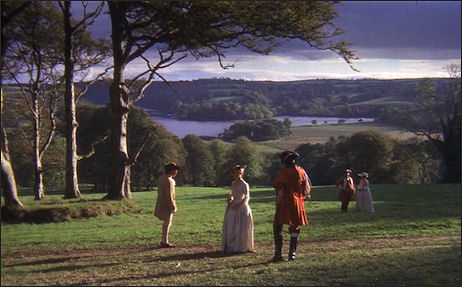
Nick Kostopolous posted the following on The Auteurs about eight months ago: “The only reason Barry Lyndon hasn’t yet made it to Warner Home Video Blu-ray is that the elements need re-mastering for the format. Because of the way the film was shot, w/its ultra-sensitive lenses & low light levels, the film poses a real challenge to master for hi-def.
“Trust me, it’ll eventually come out — it’s just a matter of time. Warner Bros. doesn’t license disc rights to the films they own to outside companies like Criterion; they feel they can do the job fine themselves, so sit tight.”
Well, here it is eight months later and no Lyndon Blu-ray. Please don’t tell me WHV is waiting to release a 40th anniversary Blu-ray in 2015….please.
Warner Home Video’s Ned Price and George Feltenstein would be well-advised to present the Barry Lyndon Blu-ray in a 1.66 to 1 aspect ratio…or else. No 1.85 to 1 crap for this masterpiece. My understanding is that Kubrick actually protected the framings for a 1.37 to 1 presentation on television, but the important thing to keep in mind is that 1.66 to 1 approximates the aspect ratio of many if not most 18th Century portraits and landscapes, which is precisely the effect that Kubrick was going for — a feeling that you were watching the Lyndon story through a prism of old paintings of the period.

Yes — “near great.” I still maintain that Lyndon, which I saw again last week, is not 100% masterful. I explained my reasoning fairly thoroughly in an article I posted nearly three years ago. Here’s a relevant portion:
“I’ve seen Barry Lyndon at least fifteen times. Possibly a bit more than that — I’ve lost count and who cares? It’s brilliant, mesmerizing, exquisite — a dry, note-perfect immersion into the climate and mores of William Makepeace Thackeray‘s novel, and, by its own terms, one of the most perfectly realized films ever made. But the problem — and this needs to be said (or re-said) with all the passionate but vaguely snobby Lyndon gushing going on these days — is that it turns sour at a very particular point.
“And, in my eyes, Barry Lyndon is just a notch below great because of the dead zone section in the second half.
“I’m speaking of the moment when Barry (Ryan O’Neal) blows pipe smoke into the face of his wife, Lady Lyndon (Marisa Berenson). Something happens at that moment, and from then on it’s ‘oh, odd…the energy is dropping, and I’m starting to enjoy this less.’ For another 30 to 40 minutes (or what feels like that amount of time), Barry Lyndon gets slower and slower, draggier and draggier, more and more morose — stately compositions, dispassionate observation, grim-faced tableaus.
“Then, finally, comes the duel with Lord Bullington (Leon Vitale) and Barry gets his groove back. Then comes that perfect, dialogue-free scene with Lady Lyndon signing checks with Bullington and Reverent Runt at her side, and she signs the annual payment to her ex-husband. And finally, that perfect epilogue.
“There’s one other draggy component that diminishes Barry Lyndon, and in fact makes the dead-zone portion even deadlier than it needs to be, and that’s Berenson’s performance. Even now, the mere thought of her glacial expression — there’s only one — in that film makes me tighten with irritation.”
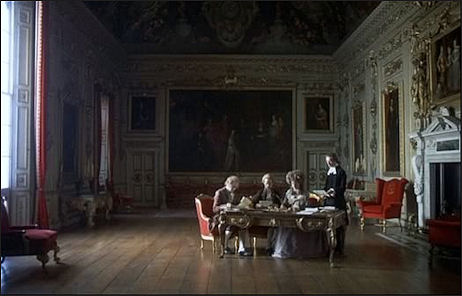
In all candor and compassion, the following 2006 Slant article by Matt Zoller Seitz (“They Are All Equal Now”) doesn’t really face up to the “dead zone” issue, which is why it’s very nearly a great piece, but not 100% so
“Barry Lyndon is perhaps Stanley Kubrick’s most uncompromising work, in the sense that of all his films it offers the least of what we’d call ‘entertainment value.’
“It’s not as raucous and cruelly funny as Dr. Strangelove and A Clockwork Orange, or awesomely chaotic as Full Metal Jacket or as cleverly structured as The Killing. It has a sense of humor, but it’s so slyly sharp — like a needle made of ice — that the film’s jokes register as tremors of discomfort. It’s the hardest of hardcore Kubrick, so hermetic that it makes 2001: A Space Odyssey seem embracing.
“At least 2001 offered audiences spectacular sci-fi vistas they had never seen before [whereas] the main innovations of Lyndon, besides John Alcott‘s justly praised, candlelit interiors, lie in the way the story is told.
“The director’s methods are so precise, so intelligent, and to this day, so necessary, that I consider the film his greatest achievement — a Kubrick film that takes a more cosmic view of humankind’s folly than any other, including 2001; a clinical epic which deliberately puts a vast chasm of identification between the characters and the viewer, a chasm which must then be bridged through sheer willpower and empathy.
“But if you stick with the movie, if you make the effort to cross that chasm, the effort is well worth it. If you adapt to Kubrick’s particular storytelling syntax and give yourself over to his detached tone, you find yourself thinking about the human race in a different way, not as a collection of individuals or nations, but as a species — as animals in clothes, animals who are mainly interested in survival and the accumulation of resources, animals who have the capacity to reason but don’t use it as often as they should, but who feel the loss of loved ones and the dashing of their own hopes as acutely as any creature, perhaps more so.
“Once you’ve hit that stage of perception, suddenly the film stops seeming cold and becomes intensely moving, because the tragedy of Sir Redmond Barry and his wife and their immediately family has become everyone’s tragedy in microcosm.”
The essential task of any quality biopic is to persuade the audience that however “good” or “bad” or likable or dislikable a person may have seemed to his/her peers (or seems right now to history), the character had his/her reasons for acting as she did and being who he/she was. So if you decide to show this person acting like an insensitive, arrogant asshole — even in a single scene — you need to explain why with a semblance of empathy.
I’m mentioning this because I’m finally seeing the Ian Dury biopic, Sex & Drugs & Rock ‘n’ Roll, at a Tribeca Film Festival screening tonight, and it occured to me this morning that I’ve been feeling slightly irate for months over a certain clip in the trailer. I’m speaking of a shot that happens around 33-second mark in which a presumably drunken Dury (Andy Serkis) pours a bottle of what looks like a bottle of white liqueur directly into a mixing board in a recording studio.
I can shrug off or at least tolerate rock stars throwing furniture out of hotel windows or seducing 15 year-old girls at L.A.’s Park Hyatt (sorry, pitchforkers!) or driving Lincoln Continentals into swimming pools — they’re expected to do this, after all, and they do have a responsibility to their fans — but only an absolute world-class wanker would ruin the mother-board circuitry in a recording studio. People who run recording studios are respected members of the rock-music fraternity, and hurting the owners of a studio by costing them untold thousands to replace a mixing board is beyond despicable.
I’m open to whatever explanation or mitigating circumstance may be presented by director Mat Whitecross, but the excuse for ruining that mixing board had better be damn good or else.
Awards Daily‘s Sasha Stone has also commented on Robert Welkos‘“Blogger War” piece for HollywoodNews. I wasn’t as taken with the slight re-hash of the Nicolas Chartier e-mail debacle as the minor bickering that flared between Stone and L.A. Times columnist Pete Hammond over the perception of an anti-Hurt Locker bias among L.A. Times contributors. Or more particularly, over Stone’s resentment of Hammond’s mild dissing of Awards Daily.
“There is a lot of tension between actual journalists — people who went to school for it, studied it and worked for newspapers and magazines until the online media began to smoke them out — and the self-made blogger,” she says. “Many of these journalists are not doing straight journalism anymore but are, by necessity, dipping their feet into the world of the blogger – which is mostly opinion-based. Most bloggers take a position because they must. Some of them still do objective reporting but it becomes harder and harder, I think, to figure out who is invested with whom.
“Welkos’ story did not go into the equally big story about last year’s race — the LA Times‘ continual Hurt Locker bashing prior to the ballot deadline. No one ever got to the bottom of that and it still hangs out there like a bad stench . This was, of course, part of the whole Chartier thing – the LA Times appeared to be taking a side. But that has never been proved nor investigated. It was just an accusation made by a few bloggers, Stu Van Airsdale among them.
“So Pete gets one more dig in when he says that I run a site for Oscar fans. I guess that’s one way to look at it. But I can tell you this much — that’s never how I’ve looked at it. There probably hasn’t been a more critical site of the Oscars and the Oscar race than this one. It may not be journalism but if it’s fandom for anything, it’s fandom for the movies.”
Hammond, contacted this morning, responds as follows: “It’s not a negative thing to say Awards Daily is a fan site, and that the content is all of a fan nature. It’s not Deadline Hollywood Daily with agents and people in the industry chiming in. I don’t look at what I said as a negative comment. [Sasha] can redefine it in her own mind, but that’s the clientele she does it for. And she’s an advocate for films, for certain films winning this or that Oscar. It’s not an average journalistic endeavor. She does what she does, and she does it well.”
Former L.A. Times reporter and current Hollywood News.com editor Robert Welkos has posted Part Uno of a two-part piece called “Inside The Blogger Wars: Finke, Waxman, Poland and Wells among others.” Kind of a lumpy-sounding title, no? But it’s a decently written thing. Welkos captures a whiff of the flavor of the 24/7 intrigue and mood-swing humor and rat-a-tat-tat of this all-consuming racket. It’s not an in-depth Vanity Fair article but it’s all right. I shrugged, I chuckled, I can roll.
It was awfully nice of Bob to bring up the Vinessa Shaw nude-photos thing again — owe ya one! A hard-core guy would have at least mentioned that my letter to 3:10 to Yuma director James Mangold went on for sixteen graphs, covering this, that and the other thing, and that just one of those fucking graphs mentioned Shaw. And that a friend/ally of Lionsgate marketing hot-shot Tim Palen fed that letter to Nikki Finke because Palen had been pissed about my criticism of the “gay” Yuma poster campaign — it was a total dirty-pool scumbag payback move. And that Finke running it was a true expression of a back-alley mentality. The other fifteen graphs were about…you know, other things! The movie, the themes, the characters, my thoughts, etc.
But you know what? Screw it. It’s over and done with, and Welkos isn’t writing a book, and he isn’t being paid $15,000 by Vanity Fair to nail each and every angle just right.
Matt Zoller Seitz intros his latest video piece as “a totally fluffy essay that will contribute absolutely nothing to anyone’s cinematic education. It’s just a collection of loud ties with sarcastic captions, scored to Three Dog Night. Enjoy!”
Dialika Krahe‘s 4.23 Der Spiegel article, titled “Nollywood’s Film Industry Second only to Bollywood in Scale,” has the following subhead: “Two-thirds of its population lives on less than a dollar a day, and yet Nigeria has the world’s second-largest film industry. It’s called Nollywood, and it provides Africa, and beyond, with a steady stream of action flicks and love stories.”
The average definite interest number for Jon Favreau‘s Iron Man 2 is 71 — 84 for under-25 males, 81 for over-25 males, 55 for under-25 females and 62 for over-25 females. That’s quite high for a film opening two weeks hence (i.e., 5.7). The average first choice figure for IM2 is 32, for God’s sake, while the average first choice for Furry Vengeance, which opens on 4.30, is 1 with an average definite interest of 19.
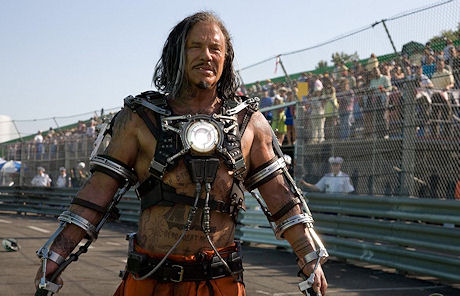
Roman Polanski pitchforkers will be heartened to learn that the likelihood of the 76 year-old director being flown back to Los Angeles for prosecution and probable jail time is now fairly high. The California 2nd District Court of Appeal has rejected the director’s 3.18 petition for an inquiry into alleged prosecutorial misconduct during his 1977 trial for unlawful sex with a minor, and now the final extradition decision is in the hands of Swiss authorities.
Dominic Patten‘s 4.23 Wrap report notes that “based on comments from the Swiss Foreign Ministry in March that such judgments are usually made within a year of the individual’s arrest, [a decision on Polanski’s extradition] may be made by September.”